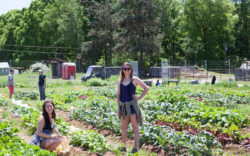Joining a CSA can be a daunting thing. Not everyone is accustomed to finding a use for bulk seasonal fruits, vegetables and/or meats on a weekly basis. But don’t let the idea of a box of veggies frighten you; joining a CSA is one of the best ways to support local agriculture while filling your own fridge.
According to Sarah Lockman, pastry chef of The National and assistant to the pastry department at Five & Ten, the key to making the most of your CSA (Community Supported Agriculture) lies in meal planning.
Lockman belongs to the brand new Collective Harvest CSA and Community Meat Co. Both of these CSAs are the work of multiple farms—Collective Harvest provides her produce and is made up of Front Field Farm, Full Moon Cooperative and Diamond Hill Farm; Community Meat Co. is composed of Anderson Farms pastured pork, Little Flock pastured poultry and Wagon Wheel Ranch’s certified grass-fed beef.
She’s found that belonging to a CSA makes it easier for her to eat healthy and to prevent being overwhelmed by options, as she is when she walks into a supermarket. And although she is a skilled cook of more than just pastries, she believes CSAs are a great way to improve culinary abilities at any level.
“Doing a CSA is a really good way just to get in the practice of standing at the stove or at the grill or roasting something—just that daily practice with limited options can be super, super liberating,” Lockman says.
When she receives her shares each week, she finds inspiration–a surprise palette of what’s in season. Then she strategizes how she will best use it.
“Almost every Sunday, I actually sort of old-school-style meal plan. It’s something my mom used to do,” she says.
Typically, she plans a frittata with vegetables for breakfast and lunch of a legume, vegetable and grain that she cooks in bulk to last the whole week. And then she makes loose plans for five dinners she’ll cook throughout the week.
She’s found that CSAs can expand your horizons in more than one way. Despite being an adventurous eater and a versatile cook, even she has been introduced to new things by her CSA experiences—among them, radishes. “I have roasted them, I have braised them, I have used them for dipping things more than I would, and they have really grown on me,” she says.
To supplement what she receives by way of CSA, Lockman keeps a well-supplied pantry of grains, vinegars, oils, spices and preserves (many of which she’s made from produce in past CSA seasons). She also recommends growing herbs like thyme, mint, oregano and basil as a simple and inexpensive way to elevate most any dish.
And for Lockman, belonging to a CSA is more than having ingredients for great meals. “It’s not just helping the farm get rid of veggies, and it’s not just helping yourself get veggies; it’s investing in them in general,” she says. “It’s like a subscription, like I believe in you enough to give you money up front that allows you to plan your future, and plan the next year and plant your garden in the fall. It just gives them the security that they have no other way of getting.”
This spring, there are a multitude of CSAs for Athens residents to choose among, most of which will be opening up for membership in the near future if they aren’t open already.
The Athens Land Trust offers a Certified Naturally Grown produce CSA from Apr. 14–Aug. 11 and a flower share from May 19–Aug. 11.
Collective Harvest is open now and begins on Apr. 14. It runs for 16 weeks, but people can join late at a prorated cost.
Woodland Gardens is an organic farm with a program a little different from a CSA that runs from April to December in four-week-long sessions, and members of this program can add organic eggs or flowers to their produce shares.
The Veggie Patch is also certified organic and has a CSA spanning from March to December, although you can also enlist for shorter memberships by season.
The Community Meat Co. membership is filled for the April to June season, but those interested in being members from July to September can sign up on June 1.
Darby Farms offers a variety of pastured protein options, ranging in size and meat combinations for CSA membership from May to August.
Sarah Lockman’s Spring Egg Drop Soup Recipe
- Serves 4
- 1/4 cup neutral oil
- 2 medium carrots, peeled and sliced
- 4 small spring onions, bulbs coarsely chopped (about 1 cup) or one medium yellow onion
- 2 garlic cloves, thinly sliced
- 1 Tbsp fresh ginger, grated
- 4 cups veggie or chicken broth
- 1/2 pound bok choy, sliced 1/2-inch thick
- 1/4 pound mizuna or spinach, sliced 1/2-inch thick
- 1/2 cup turnips, thinly sliced
- 1/2 cup radishes, thinly sliced
- 2 large eggs
- 1 Tbsp miso paste
- 1/4 cup arugula leaves
- 1/4 cup sliced scallions
- 2 teaspoons fresh lime juice
-
Heat oil in a large heavy pot over medium heat. Add carrots, onions, garlic, and ginger and season with salt. Reduce heat to medium-low, cover, and cook, stirring occasionally, until vegetables are soft, 15-20 minutes.
-
Add broth and bring to a boil. Add bok choy, mizuna, tunips and radishes and cook until vegetables are crisp-tender, about 3 minutes.
-
Meanwhile, beat eggs in a small bowl with miso, a pinch of salt, and 1 tablespoon water.
-
Reduce heat to low and stir arugula and scallions into soup. Drizzle in egg mixture in 4 or 5 spots around pot. Let stand for 1 minute so egg can set, then gently stir in lime juice. Season soup with a dash of soy sauce if desired. Serve soup topped with sriracha.Experiment with whatever greens come in your CSA box or swap bok choy for asparagus and turnips for mushrooms. Play with different combinations, this soup can be a canvas for whatever you’ve got to use!
Jodi Cash blogs at The Seed & Plate.
Like what you just read? Support Flagpole by making a donation today. Every dollar you give helps fund our ongoing mission to provide Athens with quality, independent journalism.











